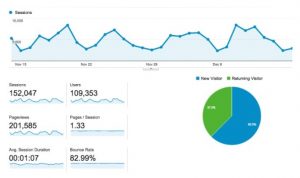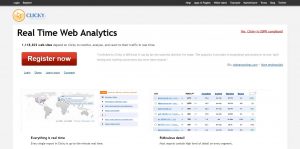Your website’s data matters. By tracking your site’s most important metrics, you can get a valuable look at how well your SEO strategy is working; what a typical customer does on your site; and even what your competitors are doing differently. To understand your web analytics, you need the right tools – and there are plenty of powerful tools out there. Here’s a round-up of ten analytics tools that you may wish to consider using.
1. Google Analytics
When it comes to web analytics tools, Google Analytics is the gold standard. It’s simple to set up, customizable, and provides all the basic information you could want about your site. With Google Analytics, you can collect data on your audience (such as age, location, and devices), and observe how visitors find, interact with, and leave your site. As it’s so popular, Google Analytics tends to be easy to integrate with other platforms. If you aren’t sure which web analytics tool is right for you, you can’t go wrong with this one.
Price: Google Analytics is free for most users. Businesses that need a large amount of data can also look into Google Analytics 360, the paid enterprise version of the tool. Cost varies based on each company’s individual needs, but expect the price to be steep – third-party sources estimate that GA 360 starts at $150,000 per year.
2. Crazy Egg
Crazy Egg is a comprehensive but easy-to-use web analytics tool. One of its most useful features is its ability to generate heatmaps and scroll maps. These show you exactly how people are scrolling through your site and where they’re clicking most frequently. You can also use Crazy Egg to run A/B tests on your site.
Price: Crazy Egg offers four pricing plans. The most basic costs $29 per month, while the pro version goes all the way up to $189 per month. You can use Crazy Egg for free for 30 days before you commit to a plan.
3. Clicky
Clicky is a powerful, flexible web analytics tool that’s often compared to Google Analytics. However, Clicky has a few features that GA doesn’t. The Big Screen feature lets you see exactly what’s happening on your site – how many visitors you have, what they’re doing, and when they’re leaving – in real time. Clicky also has a Twitter analytics feature that lets you search for mentions of your business on Twitter.
Price: You can use Clicky for free, but to unlock all the features that make this tool unique, you’ll need to spring for the paid version. Prices start at $9.99 per month or $79.99 per year.
4. Kissmetrics
If you want to gather data on each customer’s journey through your sales funnel, Kissmetrics might be the perfect analytics tool for you. This people-focused tool tracks individuals through multiple visits to your site (something Google Analytics doesn’t do), which helps you understand how and why they make purchasing decisions. Kissmetrics also has email marketing functionality built in, so you can send automated emails to leads based on how they behave on your site.
Price: Kissmetrics starts at $500 per month.
5. Chartbeat
Chartbeat is an analytics tool that monitors how people interact with your content. If you publish a lot of content of any type, Chartbeat might be an ideal way to gather all your data into one place.
Price: Chartbeat doesn’t disclose their prices on their website, but third-party sources estimate that their pricing starts at $7000 per year.
6. Optimizely
Testing your site is crucial for good UX, but running experiments without the help of specialized software can be slow, unwieldy, and error-prone. Optimizely was created as a solution to this problem. This tool helps you easily run A/B tests on your site so you can optimize based on data, not guesswork.
Price: Optimizely doesn’t publish prices on their site, so you’ll need to contact their sales team for a quote. However, other sources estimate that their prices start around $36,000 per year.
7. SEMrush

Ever wish you could spy on your competitors’ top-performing keywords? SEMrush will help you do just that.
SEMrush is an all-in-one marketing and analytics tool. While it comes with standard SEO- and PPC-tracking functionality, its standout features are its keyword research and competitive analysis tools. SEMrush shows you which keywords are sending your competitors traffic, which can help to inform your own keyword strategy. The tool also helps you find new keywords of your own, regardless of what your competitors are doing.
Price: SEMrush starts at $99.95 per month. Businesses and agencies that need more features can expect to pay up to $399.95 per month.
8. Matomo
Matomo, formerly known as Piwik, is a popular open-source alternative to Google Analytics. Unlike GA, Matomo is hosted on your own server, and you own all of your data. Matomo is also highly customizable – if you need more features, you can search its library of 70 plugins. Matomo is a great analytics tool for companies that care about privacy.
Price: Matomo is free, but some of the plugins cost.
9. Mixpanel
Mixpanel is an analytics platform similar to Google Analytics. Event tracking is one of this tool’s main features – thanks to Mixpanel’s intuitive interface, users can specify events to track without having to code those events by hand. Mixpanel also offers excellent customer service to all users, regardless of which plan they’re using.
Price: Mixpanel offers free accounts with limited functionality. To unlock the full power of the tool, prices start at $999 per year.
10. Heap
Heap offers users two main benefits – it’s simple to use, and it’s extremely thorough. This tool captures everything that happens on your site – every click, form submission, page view, and search. If you want a granular look at exactly how visitors are using your site, Heap might be the perfect tool for the job.
Price: Heap is free if you have fewer than 5000 visitors to your site every month. If you need more data than that, you’ll have to contact Heap for a quote, but third-party sources estimate that the paid version of Heap starts at $500 per month.
Conclusions
There are tons of analytics tools out there to choose from. To decide which one is right for your company, think carefully about which metrics you want to measure on your site and how simple (or technical) you want your tools to be. If your budget allows for it, there’s no reason you have to limit yourself to a single analytics tool – using more than one can give you a better-rounded picture of what’s going on with your site. Use this list as a starting point for your own research, and you’re sure to find an analytics tool that fits your needs perfectly.
Amanda DiSilvestro is a writer for No Risk SEO, an all-in-one reporting platform for agencies. You can connect with Amanda on Twitter and LinkedIn, or check out her content services at amandadisilvestro.com.
source https://searchenginewatch.com/2018/06/04/the-top-10-tools-for-getting-an-insight-into-your-website-analytics/









No comments:
Post a Comment